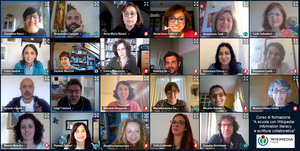Libre and Open Source
Wikimedia Italy believes in Free/Libre and Open Source software as the only good way to freely share in the sum of all knowledge.
This page describes some Free/Libre software in use in the WMIT association, and why.
Why Freedom is important
- About proprietary software
- We want to live in a world where our goals are achievable with Libre software. Sometime this is easy, sometime this is not. When it's not, WMIT is committed to describe this bug and design a solution, in order to solve it in medium or long time.
- Our success story
- 2016, WMIT migrated successfully from Dropbox to ownCloud
- 2020, WMIT migrated successfully from Google Meet to BigBlueButton
- 2021, WMIT migrated successfully from Google Form to LimeSurvey (then Wikimedia Foundation as well)
- 2022, WMIT started the migration from a proprietary CRM to CiviCRM with active development
Web browsing: Firefox
Wikipedia exists since it's rendered by a web browser. We need a modern, secure, fast and well-optimized web browser, to keep our contributions secure. We are grateful to Mozilla Firefox and Chromium, dedicated to heavy security standards, openness and anonymization and 100% history ownership, and available under a Free/Libre software license, encouraging independent security auditing.
That is why we recommend Mozilla Firefox and Chromium (and we advise against Microsoft Edge, Chrome, Opera, and any other proprietary web browser) since the browser should not control its users.
- Firefox advantages
- worldwide trusted, transparently verified by independent third parties
- highly customizable
- Firefox disadvantages
- some websites are boycotting it
- Official website
- Wikipedia page
Survey: LimeSurvey
- Historical context
During the 2020-2021 COVID-19 pandemic, there has been increasing use of online questionnaires, especially using Google Forms, also from the staff of Wikimedia Foundation to involve volunteers. There had been talk in using LimeSurvey, but several security problems had been found in the past, and LimeSurvey had been shelved.
With the goal of improving LimeSurvey adoption, in 2021 Italian Linux Society (partner of Wikimedia Italy) invested in security auditing on this software. After that, Wikimedia Italy adopted a self-hosted LimeSurvey. Then, also after an incident with Google Form, in 2022 LimeSurvey was successfully adopted by Wikimedia Foundation.[1]
- LimeSurvey advantages
- powerful platform really multi-language
- powerful flexible user roles
- 100% data ownership
- GDPR friendly
- no limitations / easy to hack and extend
- LimeSurvey disadvantages
- not suitable for fast prototyping or hot changes
- About LimeSurvey in Wikimedia projects
- About LimeSurvey in Wikimedia Italy
Project management: Wikimedia Phabricator
Wikimedia Phabricator is a very good piece of software that increase team throughput, focusing about things, identify deadlocks, and with good backlog management.
- Wikimedia Phabricator advantages
- accurate sub-task management and visualization (to better triage blocking parts)
- powerful access level system (ability to create private "Spaces", to have private and public Tasks organized together)
- trasparency (no need to login to see something)
- not project-centric (a single Task can involve multiple projects or departments)
- transparency (no need to login to see something)
- Wikimedia Phabricator disadvantages
- not so popular or mainstream
- About Wikimedia Phabricator
Videocall: BigBlueButton and Jitsi Meeting
We use BigBlueButton for serious meetings (e.g. assembly) and for staff meetings, since it has very powerful moderation tools, plus a collaborative whiteboard.
The problem with BigBlueButton is that our local service provider is very strict in our integration with Moodle. For example, in our BBB, guests cannot change their names. So, we usually invite special guests in Moodle, so they have a name. That's why sometime Jitsi Meeting is preferred.
Jitsi Meeting is nice because it's very easy and it natively allows streaming to any social network (whatever RMTP URL), and it has advanced audio volume management, for each participant.
File archiviation: Nextcloud
Since 2016, Wikimedia Italy adopted NextCloud as primary file sharing platform for the whole staff.
At first we used NextCloud together with LibreOffice, to co-work on files and immediately share changes.
In 2021 we adopted OnlyOffice together with LibreOffice, for real-time collaboration from a web interface, still allowing full access with LibreOffice.




